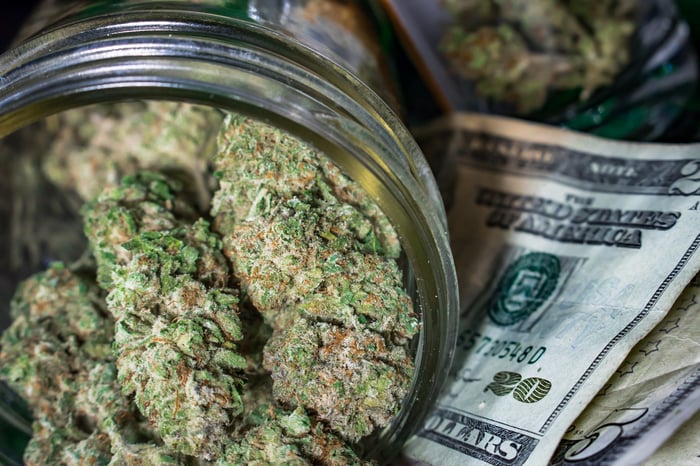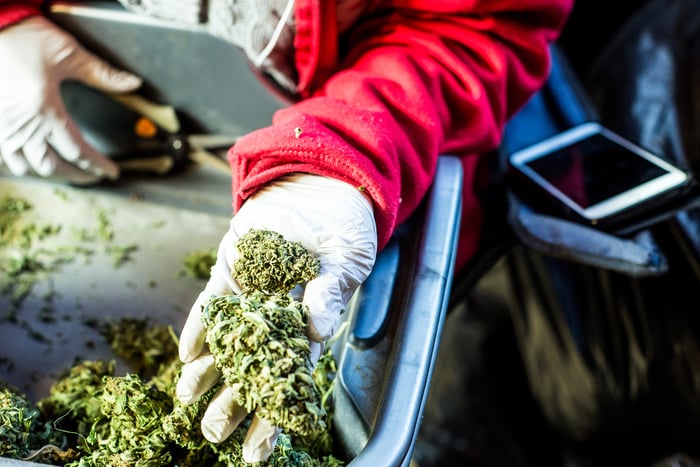The marijuana industry is being reshaped before our eyes. In only 12 days, Canada will make history by becoming the first developed country in the world to legalize recreational marijuana. When that happens, consumer euphoria, along with domestic and foreign demand, should allow the legalized Canadian industry to bring in around $5 billion in added annual revenue.
Based on the performance of marijuana stocks since the beginning of 2016 -- many of the biggest publicly traded names out there are up more than 1,000% in less than three years -- it's pretty evident that investors expect the industry to be the greatest thing since sliced bread. But there are factors at work that could prevent marijuana stocks from living up to investors' lofty expectations. Here are four ways pot stock investors will probably be disappointed.

Image source: Getty Images.
1. Production ramp-up is still ongoing
The first thing marijuana stock investors need to realize is that while pot stocks have thrown around lofty peak production figures, none of them are producing at anywhere near that rate at the moment.
For instance, Aurora Cannabis (ACB -2.79%) expects to be at the top of the pack in terms of peak production. The company has previously guided to 570,000 kilograms at full production capacity, and this doesn't include its ongoing acquisition of ICC Labs, which has more than 1.1 million square feet of greenhouses being developed, along with 92,000 square feet of existing facilities. Yet, in Aurora Cannabis' latest earnings report, it notes a current annual run rate of just 45,000 kilograms, with an end-of-fiscal-2019 goal (June 30, 2019) of 150,000 kilograms. That's not even close to what Wall Street or investors are expecting, and it could be reflected in weaker-than-expected sales figures.
The Green Organic Dutchman (TGOD.F -1.00%) is another such instance. At 195,000 kilograms of estimated peak production, it'll likely slide in as the fourth-largest producer among pot stock. However, The Green Organic Dutchman doesn't even expect to begin harvesting cannabis until the first half of next year! Taking into account all of the company's recent acquisition and partnership announcements, it could be years before The Green Organic Dutchman is operating at full steam. In short, the ongoing production ramp-up probably means less in sales than euphoric investors expect.

Image source: Getty Images.
2. Initial sales will focus on low-margin product
A second consideration to make is that the marijuana industry won't have a full complement of products at its disposal when the green flag waves on Oct. 17.
When Canada's Parliament passed the Cannabis Act on June 19, it wound up legalizing the use of dried cannabis flower and cannabis oil, period. Other forms of consumption, such as edibles, vapes, concentrates, and cannabis-infused beverages, won't be legal in 12 days. The expectation is that Parliament will review (and likely approve) additional options to consume cannabis in 2019, but there's no official timetable on when that'll happen.
The reason this matters is because dried flower is traditionally a lower-margin, easily commoditized product. Though there isn't a lot of precedence to recreational marijuana legalization, a handful of U.S. states have done so. In Colorado, Washington, and Oregon, sales of the drug have soared, but the per-gram price of dried flower has plunged precipitously in the months following legalization. Chances are the same thing will happen in Canada as growers simply produce as much as they can as opposed to producing to meet demand.
Meanwhile, the alternative products mentioned above (including cannabis oils) tend to have much higher margins and less pricing pressure. Unfortunately, with the exception of oils, it could be a while before marijuana stocks are able to take advantage of these alternative pot products and their beefier margins.

Image source: Getty Images.
3. Share-based dilution will weigh on EPS
Though it's a point you're probably tired of hearing about, it's nevertheless an important consideration: share-based dilution weighing on earnings per share.
Prior to the passage of the Cannabis Act, pot stocks had virtually no means of raising money in a non-dilutive way. Even if financial institutions wanted to offer loans, lines of credit, or even checking accounts to weed businesses, they chose not to for fear of facing criminal and/or financial penalties. This left marijuana stocks one option to raise capital: bought-deal offerings.
A bought-deal offering involves the sale of common stock, convertible notes, stock options, and/or warrants to an investor or group of investors in order to raise capital. This capital is what these pot companies have used to expand their capacity, make acquisitions, build their brands, and so on. However, the sale of common stock, convertible notes, stock options, and/or warrants also steadily increases the number of shares outstanding for marijuana stocks. The more shares there are outstanding, the more pressure is placed on earnings per share.
For instance, the king of production, Aurora Cannabis, had just 16 million shares outstanding when fiscal 2014 ended. By the time its current fiscal year ends, it'll likely have more than 1 billion. That makes it incrementally tougher for Aurora to produce a meaningful per-share profit.

Image source: Getty Images.
4. The black market will cede less market share than expected
Lastly, don't overlook the very real possibility that the black market hangs onto a larger share of cannabis sales than investors realize.
Just two years ago, the black market accounted for more than 85% of North American weed sales. Though this figure should decline considerably with Canada legalizing recreational pot, and 30 U.S. states having OK'd the use of medical marijuana, overhead costs on the legal side of the equation continue to be restrictive to success.
In Canada, Prime Minister Justin Trudeau aims to tackle the black-market problem by imposing an excise tax of roughly 10% on recreational weed sales. Comparatively, alcohol excise taxes range from 50% to 80% in Canada. Yet, even at 10% this becomes a problem. The illegal market doesn't have to pay license or permit fees, federal income tax, or excise taxes to the federal government. This should allow illicit cannabis to consistently undercut legal channels on price. And while illicit marijuana is by definition illegal, it won't stop some consumers from continuing to buy from these lesser-expensive channels.
In other words, the black market won't go down without a fight, which means the real possibility of disappointing profits for marijuana stocks.





